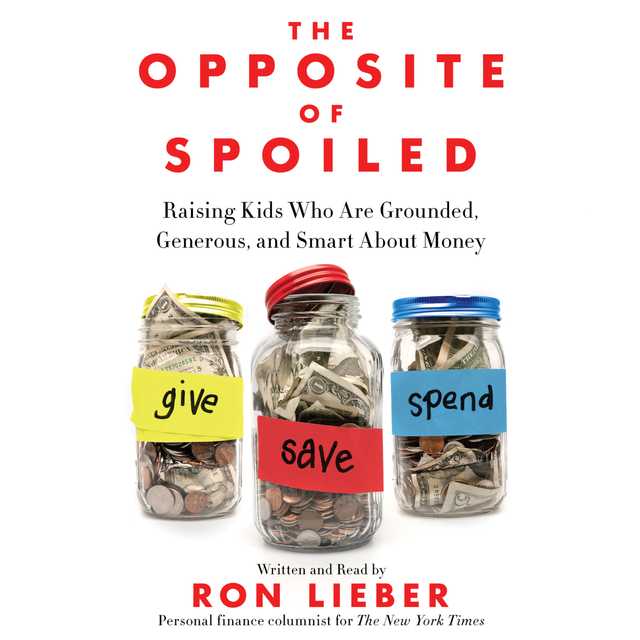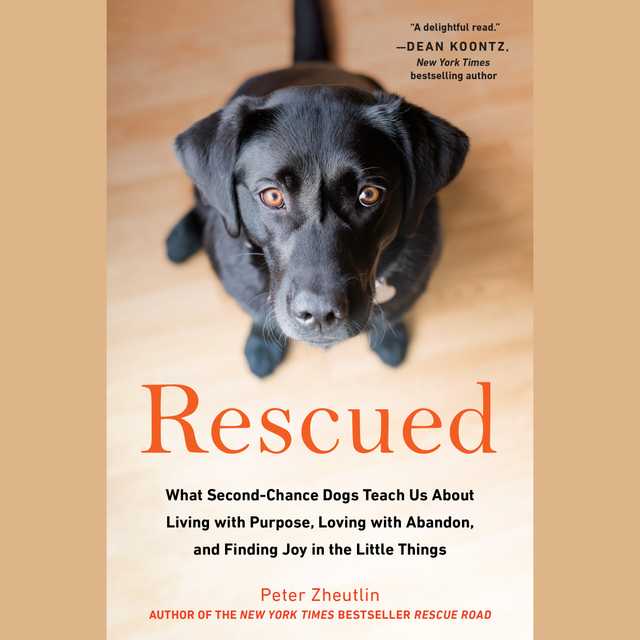The Opposite of Spoiled Audiobook Summary
New York Times Bestseller
“We all want to raise children with good values–children who are the opposite of spoiled–yet we often neglect to talk to our children about money. . . . From handling the tooth fairy, to tips on allowance, chores, charity, checking accounts, and part-time jobs, this engaging and important book is a must-read for parents.” — Gretchen Rubin, author of The Happiness Project
In the spirit of Wendy Mogel’s The Blessing of a Skinned Knee and Po Bronson and Ashley Merryman’s Nurture Shock, New York Times “Your Money” columnist Ron Lieber delivers a taboo-shattering manifesto that explains how talking openly to children about money can help parents raise modest, patient, grounded young adults who are financially wise beyond their years.
For Ron Lieber, a personal finance columnist and father, good parenting means talking about money with our kids. Children are hyper-aware of money, and they have scores of questions about its nuances. But when parents shy away from the topic, they lose a tremendous opportunity–not just to model the basic financial behaviors that are increasingly important for young adults but also to imprint lessons about what the family truly values.
Written in a warm, accessible voice, grounded in real-world experience and stories from families with a range of incomes, The Opposite of Spoiled is both a practical guidebook and a values-based philosophy. The foundation of the book is a detailed blueprint for the best ways to handle the basics: the tooth fairy, allowance, chores, charity, saving, birthdays, holidays, cell phones, checking accounts, clothing, cars, part-time jobs, and college tuition. It identifies a set of traits and virtues that embody the opposite of spoiled, and shares how to embrace the topic of money to help parents raise kids who are more generous and less materialistic.
But The Opposite of Spoiled is also a promise to our kids that we will make them better with money than we are. It is for all of the parents who know that honest conversations about money with their curious children can help them become more patient and prudent, but who don’t know how and when to start.
Other Top Audiobooks
The Opposite of Spoiled Audiobook Narrator
Ron Lieber is the narrator of The Opposite of Spoiled audiobook that was written by Ron Lieber
Ron Lieber is the author of The Opposite of Spoiled and is the Your Money columnist for the New York Times. Three of his books have been New York Times bestsellers, and he is a three-time winner of the Gerald Loeb Award, business journalism’s highest honor. He lives in Brooklyn with his wife, New York Times reporter Jodi Kantor, and their two daughters.
About the Author(s) of The Opposite of Spoiled
Ron Lieber is the author of The Opposite of Spoiled
More From the Same
- Author : Ron Lieber
- The Price You Pay for College
- Publisher : HarperAudio
- Abraham
- American Gods [TV Tie-In]
- Dead Ringer
- House of Sand and Fog
- Prey
The Opposite of Spoiled Full Details
| Narrator | Ron Lieber |
| Length | 6 hours 42 minutes |
| Author | Ron Lieber |
| Category | |
| Publisher | HarperAudio |
| Release date | February 03, 2015 |
| ISBN | 9780062372444 |
Subjects
The publisher of the The Opposite of Spoiled is HarperAudio. includes the following subjects: The BISAC Subject Code is Family & Relationships, General, Parenting
Additional info
The publisher of the The Opposite of Spoiled is HarperAudio. The imprint is HarperAudio. It is supplied by HarperAudio. The ISBN-13 is 9780062372444.
Global Availability
This book is only available in the United States.
Goodreads Reviews
Louise
February 05, 2015
(I received a galley of this from the publisher)After reading the piece Ron Lieber did on the times about this very subject (here), I was intrigued about the book. While most of the information in this book won't apply to my child for a few more years, it was still good to get the seed planted. Like many Chinese, I grew up in a family where money was talked about a lot, so I couldn't really relate to some of the families in this book. I still found it informational though, because the taboo about talking about money in public is still widely practiced with my non-Chinese friends. The main concern that made me want to read this was about raising a child who was not entitled and would be smart about money, which Lieber addresses fairly well.There aren't explicit answers in this book to the common but difficult questions surrounding kids and money, but I appreciated that it had many examples of what other parents did and what worked for them. A specific takeaway that made reading this worth it is the idea of giving coupons instead of gifts or money for presents. Coupons that say, "skip eating vegetables for one meal without any consequences" or "stop what you're doing and play with me" would probably be just as exciting for kids than a new toy.
Rachel
February 22, 2015
This was a one-day read for me. The book was easy to read, but the topic is something we discuss in our household without reaching any easy answers. When kids are raised in a household that wants for very little, how do we teach them to be grateful for this abundance? How do we start teaching kids financial literacy? Kids are naturally curious and this book gives great advice about tackling questions related to poverty, charity, salaries, expenses, budgets, and decision-making. I'll be re-reading this book with my husband so we can apply this to our lives thoughtfully. Highly recommended to parents of any income bracket.
Daina
January 30, 2016
First, to be nit-picky, this book could have benefitted from better editing - both with details (too many sentences starting with "so"!) and the bigger picture. Second/however, I cannot justify giving it a lower rating, because the book raises and discusses issues that are too often overlooked in our society, or seem so overwhelming that no one wishes to ever address them in any meaningful way. While the author's writing style can be a bit annoying, the book does contain many interesting anecdotes on how various families and schools handle different issues and situations, and generally addresses issues which really need to be considered by more American families and parents.
Patrick
April 08, 2015
Being a parent is tough. It's literally the most rewarding thing a person can do, but there is no instruction manual. The thing you learn early on is that everyone is just winging it. Your parents, your grandparents, Adam, Eve, Noah. Winging it, every last one of them. The problem with that is you second-guess yourself constantly. Am I doing this well? Am I taking short-cuts? And the truth is, you'll never know for sure until it's too late, and you're either attending your kid's Ivy League graduation, or bailing them out of jail for the 3rd time.My wife and I do okay. We're upwardly mobile, but we're surrounded by people of similar circumstances, so it's easy to forget how well my kids have it. Every parent has their "in my day, we never had iPhones or Facebook -- we went outside and played with our friends. And we liked it!" And that's true. And maybe it's better. But more likely, it's just different. And that's the thing -- every generation is different, and every parent is left to navigate a new world that they don't totally understand, or even realize is the world they're living in now. So you can't just look around and say, "well, the Smiths do it this way, that's good enough for me." You have to figure it out for yourself as you go. Wing it. And that's a tough thing to do when your responsible for the happiness and well-being of small human lives.So it's helpful to have books like "The Opposite of Spoiled" to help guide the way. Not every piece of advice or idea is perfect, but they're all well-thought out and intentioned. There are a number of tips and ideas that my wife and I have already instituted (the save, spend, donate jars for allowance, the idea of giving kids fiscal responsibility and allowing them to make mistakes with it), and many more that we'll keep in mind as our kids get older. Some of the advice is silly, or even a little condescending (more so from uber-rich parents giving their advice or experiences than the author, but implicitly condoned by their inclusion in the book), and I rolled my eyes more than once, but I appreciate what Lieber is trying to do with this book, and all the stories and anecdotes come from a perspective of trying to improve the world and our kids. It's a good quick read, and I feel like it's made me a better parent already.
Anna
January 25, 2021
In my opinion, a really excellent book, one of the best I’ve read so far in both genres: parenting and personal finance. Takes a big-picture, values-centered approach with enough specific examples and suggestions to be concretely useful. My daughter is a bit too young for most of the practical ideas, so I’d probably like to read again in a few years. One of the only personal finance books I’ve read that didn’t make me despair at the amorality.
Jody
February 10, 2022
If you’re interested in reading this book I suggest you do. If you want practical ideas they are here but they aren’t listed out in a direct how-to. You can get that online. If you’re reading this it’s because you want a deeper dive. There may be times this book will upset you. Your “trigger” might be that the author says most Americans are middle class. It may be when he says you shouldn’t be ashamed if you have more and fails to call out the one percenters who are forcing us to struggle more. Indeed, a lot of this book seems aimed at people who aren’t struggling. But, this is why struggling people should read it!No matter what you should educate your child about money & giving! Even if your family can only afford to give a little, this book shows how it will make your child happier. Note: This book I mentions children and families with disabilities twice. It is in no way geared towards Neuro atypical/ disabled people or kids who have very different struggles with jobs, money management, and time. As a disabled mom with an ADHD kid I could rant about this. Instead I’m so glad I read the book and I know I need to work harder to think about how to modify these ideas for my family. While we have to worry more we will still be giving. As someone who was often the object of pity and unwanted charity this book does a great job in talking about how to give responsibly and ethically.
Heather
November 21, 2019
This book was exactly what I’d hoped it be. It provides practical advice on teaching children to handle money, including why allowance is important (money is a teaching tool and practice during childhood is important in order to succeed with whatever your income in adulthood). I’ll admit to being a complete failure in this department with my 12 year old, but no more. We have a plan and she’s thrilled with her newfound financial freedom. Also, this book was great on audio as it’s loaded with anecdotes and reasoning for his very simple system.
Renae
January 15, 2020
I really enjoyed this book as a collection of stories and best practices used by parents who have raised grounded children. I wish that the best practices had been simplified and there had been a clear summary of the lessons learned, but I appreciated it for what it was.
Molly
February 14, 2022
Great information and observations put forth by the author. It definitely is geared more towards families with “excess”. Some practices are a little outlandish for my personal life, but the last two chapters regarding gratitude and “how much is enough” were worth the whole book to me.
Ali
March 07, 2015
I enjoyed Ron's book and it has already provoked some very thoughtful discussions with my husband about how we talk to our kids about finances. Based on the stories and the suggestions in the books we are going to make some changes to how we handle our family economy. We will still tie allowance to chores (or requirements as they are called in our house) as I did not find his argument at all convincing that the two should not be linked. We will however allow freer access to the money they do earn (going with with the three jars rather than the "checking" system we have in place now). We will also be encouraging our children to work - both at extra money paying chores at home and at outside jobs. We are still working out the parameters, but we will also be requiring them to save money towards college. I already had a discussion with me eleven-year old today about how much college costs after he started asking about dorm rooms. We plan to be much more open with them about money and how it all works. I only gave the book four stars because I often felt like the chapters were building to something more definitive in terms of suggestions, but then they just ended. Nonetheless, there was a lot of valuable stuff in the stories and anecdotes. I took a lot of notes and we have more reading to do, documentaries to seek out and projects to undertake because of this book. I definitely recommend it.
Amy
November 13, 2015
The concepts in the book are insightful but honestly it all could have been condensed into a blog post. Nevertheless we are following the author's recommendations by dividing our allowance into giving saving and spending. When my daughter blew all her spending money on junk from the Ren fair I smiled and let her buyers remorse set in. The negotiations about what she is actually saving for has been priceless.
Most Popular Audiobooks
Frequently asked questions
Listening to audiobooks not only easy, it is also very convenient. You can listen to audiobooks on almost every device. From your laptop to your smart phone or even a smart speaker like Apple HomePod or even Alexa. Here’s how you can get started listening to audiobooks.
- 1. Download your favorite audiobook app such as Speechify.
- 2. Sign up for an account.
- 3. Browse the library for the best audiobooks and select the first one for free
- 4. Download the audiobook file to your device
- 5. Open the Speechify audiobook app and select the audiobook you want to listen to.
- 6. Adjust the playback speed and other settings to your preference.
- 7. Press play and enjoy!
While you can listen to the bestsellers on almost any device, and preferences may vary, generally smart phones are offer the most convenience factor. You could be working out, grocery shopping, or even watching your dog in the dog park on a Saturday morning.
However, most audiobook apps work across multiple devices so you can pick up that riveting new Stephen King book you started at the dog park, back on your laptop when you get back home.
Speechify is one of the best apps for audiobooks. The pricing structure is the most competitive in the market and the app is easy to use. It features the best sellers and award winning authors. Listen to your favorite books or discover new ones and listen to real voice actors read to you. Getting started is easy, the first book is free.
Research showcasing the brain health benefits of reading on a regular basis is wide-ranging and undeniable. However, research comparing the benefits of reading vs listening is much more sparse. According to professor of psychology and author Dr. Kristen Willeumier, though, there is good reason to believe that the reading experience provided by audiobooks offers many of the same brain benefits as reading a physical book.
Audiobooks are recordings of books that are read aloud by a professional voice actor. The recordings are typically available for purchase and download in digital formats such as MP3, WMA, or AAC. They can also be streamed from online services like Speechify, Audible, AppleBooks, or Spotify.
You simply download the app onto your smart phone, create your account, and in Speechify, you can choose your first book, from our vast library of best-sellers and classics, to read for free.
Audiobooks, like real books can add up over time. Here’s where you can listen to audiobooks for free. Speechify let’s you read your first best seller for free. Apart from that, we have a vast selection of free audiobooks that you can enjoy. Get the same rich experience no matter if the book was free or not.
It depends. Yes, there are free audiobooks and paid audiobooks. Speechify offers a blend of both!
It varies. The easiest way depends on a few things. The app and service you use, which device, and platform. Speechify is the easiest way to listen to audiobooks. Downloading the app is quick. It is not a large app and does not eat up space on your iPhone or Android device.
Listening to audiobooks on your smart phone, with Speechify, is the easiest way to listen to audiobooks.






























